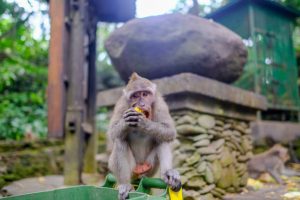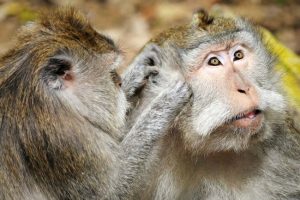 Gambling and the skills to do so might be deeply rooted in our mentality, something researchers are willing to explore in real life conditions. Jean-Baptiste Leca, a professor in the psychology department of the University of Lethbridge is currently working with Rob Williams, a gambling research expert in the university’s Faculty of Health Sciences.
Gambling and the skills to do so might be deeply rooted in our mentality, something researchers are willing to explore in real life conditions. Jean-Baptiste Leca, a professor in the psychology department of the University of Lethbridge is currently working with Rob Williams, a gambling research expert in the university’s Faculty of Health Sciences.
Their team would explore Balinese Long-tailed macaque monkeys and their gambling potential. For many years now, monkeys are considered to hide many secrets about our own mentality and the way our brains work.
They could be researched for behavioral patterns that resemble our own perception of the world and how we approach it. This is especially true when it comes to gambling, a specific activity with a signature pattern that could improve in time. A university professor is willing to place the next milestone in his career with this second research.
They Can Barter But what about Gambling?
 Prof. Leca has previously researched the said monkeys and their habits of bartering with objects they had stolen from tourists. This process could take minutes and the monkeys appear to understand that sometimes the longer they wait, the better food items they get to receive. Mr. Leca researched their behavior and what guides them, but this study also triggered the second one.
Prof. Leca has previously researched the said monkeys and their habits of bartering with objects they had stolen from tourists. This process could take minutes and the monkeys appear to understand that sometimes the longer they wait, the better food items they get to receive. Mr. Leca researched their behavior and what guides them, but this study also triggered the second one.
The two professors would work in collaboration with their Italian partner in this project, cognitive psychologist Elsa Addessi at the National Research Centre in Rome. The macaques found in Bali resemble the ones that came from Japan to the Calgary Zoo. This second research is about to be a more extensive one, aiming to find out whether the animals are capable of understanding gambling, as well as some of its more sophisticated principles, such as the cognitive bias.
There is a possibility that the monkeys in question have an entirely different approach to gambling when compared to humans and this could reveal more about their brains. While the first study focused on a particular barter process with two already known objects that have to change their owners, the gambling one would be a rather different experience.
Research Starts this Summer
The long-tailed macaques are going to be subjected to various gambling scenarios this summer when Mr. Leca is about to travel to Bali. He is going to study their behavior in real-life conditions. He is going to be joined by Graduate students Matthew Gardiner, Caleb Bunselmeyer, and Christian Dunn also focusing on the monkeys.
For the primates, it all could seem like a bartering situation, until the element of chance related to gambling finds its way in. Essential for this research would be the problem gambling factor that has a significant impact on many people’s lives. Researchers are going to seek the potentially harmful impact of wrong choices while gambling. Since it is irrational behavior, it needs research that is best done outside the lab.
Veit Stuphorn, an associate professor at Johns Hopkins University’s Zanvyl Krieger Mind/Brain Institute coauthored a piece for the Current Biology journal which came out September 2018. In it, he laid out the research done on two rhesus monkeys that had to gamble against a computer. The two animals appeared to enjoy the activity, taking great risks, until the prefrontal cortex areas of their brains were temporarily inactivated. They continued understanding gambling but began liking it less.



















